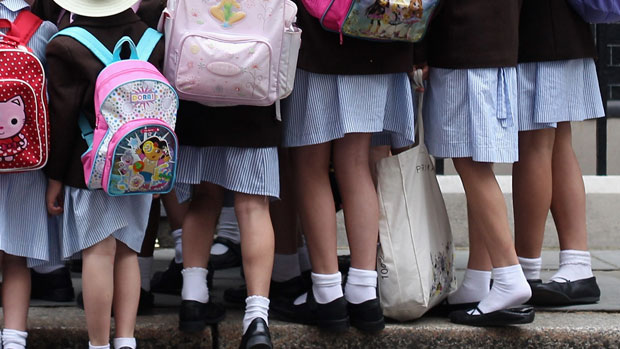Childhood obesity: 22,000 Year Six pupils ‘severely obese’
One in 25 students in England and Wales dangerously overweight

A free daily email with the biggest news stories of the day – and the best features from TheWeek.com
You are now subscribed
Your newsletter sign-up was successful
More than 20,000 Year Six pupils in England and Wales are classified as ‘severely obese’, as experts warn that soaring rates of childhood obesity are creating a health timebomb.
Data obtained by local authorities show that 22,646 children - or one in 25 - in their final year of primary education were classified in the highest bracket of obesity by the National Child Measurement Programme in 2016/2017.
The average primary school class size in English state schools in 2016 was 27.1, meaning that there is slightly more than one dangerously overweight pupil per class.
The Week
Escape your echo chamber. Get the facts behind the news, plus analysis from multiple perspectives.

Sign up for The Week's Free Newsletters
From our morning news briefing to a weekly Good News Newsletter, get the best of The Week delivered directly to your inbox.
From our morning news briefing to a weekly Good News Newsletter, get the best of The Week delivered directly to your inbox.
Overall, 4.1% of pupils are severely obese by the end of primary school, compared to just 2.35% of reception pupils, suggesting that some are “gaining weight at a drastic rate as they go through school”, says the Local Government Association (LGA), which represents local councils in England and Wales.
Obesity increases the risk of developing “diabetes, heart disease, stroke and cancer”, says The Daily Telegraph, and “can also shorten a person’s life by 10 years”, a loss equivalent to lifelong smoking.
The LGA says action must be taken to prevent a generation of dangerously overweight children growing into a “multi-billion-pound ill-health time bomb”.
The body “claims that £600m cuts to council public health grants is preventing work to combat childhood obesity” and urged the Government to reverse the cuts, the Times Educational Supplement reports.
A free daily email with the biggest news stories of the day – and the best features from TheWeek.com
They are also calling for further reforms, such as “councils having a say in how and where the soft drinks levy is spent, better labelling on food and drink products, and for councils to be given powers to ban junk food advertising near schools”, Sky News reports.
The LGA also emphasised the need for “targeted intervention” to tackle disproportionately high rates of obesity among children in the most deprived areas, and those from minority ethnic groups.
A Department of Health and Social Care spokesman defended the Government’s programme for tackling childhood obesity as “among the most comprehensive in the world”.
“However, we have always been very clear that this is the not the final word on obesity, and we have not ruled out further action if the right results are not seen.”
-
 Local elections 2026: where are they and who is expected to win?
Local elections 2026: where are they and who is expected to win?The Explainer Labour is braced for heavy losses and U-turn on postponing some council elections hasn’t helped the party’s prospects
-
 6 of the world’s most accessible destinations
6 of the world’s most accessible destinationsThe Week Recommends Experience all of Berlin, Singapore and Sydney
-
 How the FCC’s ‘equal time’ rule works
How the FCC’s ‘equal time’ rule worksIn the Spotlight The law is at the heart of the Colbert-CBS conflict
-
 Obesity drugs: Will Trump’s plan lower costs?
Obesity drugs: Will Trump’s plan lower costs?Feature Even $149 a month, the advertised price for a starting dose of a still-in-development GLP-1 pill on TrumpRx, will be too big a burden for the many Americans ‘struggling to afford groceries’
-
 The battle of the weight-loss drugs
The battle of the weight-loss drugsTalking Point Can Novo Nordisk and Eli Lilly regain their former stock market glory? A lot is riding on next year's pills
-
 Food may contribute more to obesity than exercise
Food may contribute more to obesity than exerciseUnder the radar The devil's in the diet
-
 Why women are most at risk in Africa's obesity crisis
Why women are most at risk in Africa's obesity crisisUnder the Radar Stigma and lack of access to medication draws comparisons with HIV epidemic
-
 Why are people microdosing Ozempic?
Why are people microdosing Ozempic?In The Spotlight Tiny doses of the weight-loss drug can sidestep its unpleasant side effects, say influencers. But is customising the dose a good idea?
-
 Ozempic babies: a surprise side effect of weight loss drugs
Ozempic babies: a surprise side effect of weight loss drugsunder the radar Murmurs of unexpected pregnancies while taking semaglutide-based drugs are growing on social media
-
 Why Americans are getting shorter
Why Americans are getting shorterUnder the radar Wealth inequality handed the country's citizens the short end of the stick
-
 2023: the year of the weight-loss drug craze
2023: the year of the weight-loss drug crazethe explainer From celebs to social media, Ozempic was everywhere this year